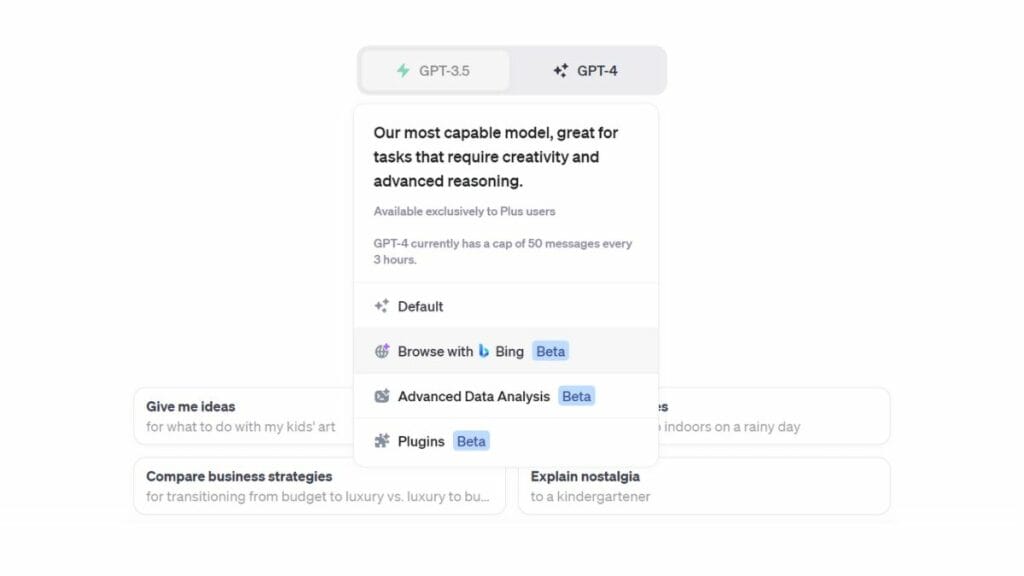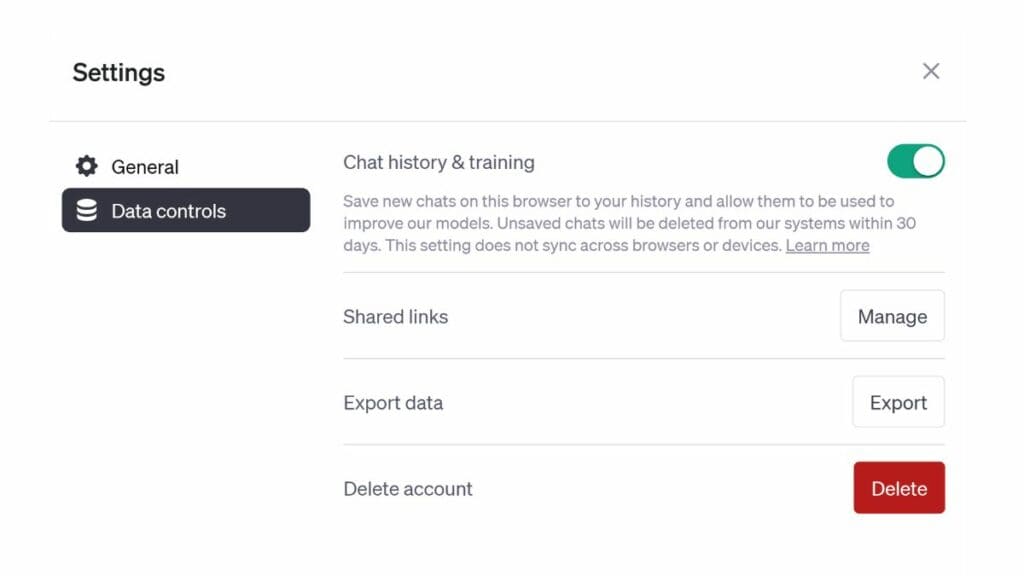How does ChatGPT use your data?

Table of Contents
ChatGPT is the worlds favourite Large Language Model (LLM). A generative AI model of this type is defined by its incredibly large training dataset of text. OpenAI must constantly be training their models to keep up with the competition from Microsoft’s Bing Chat and Google Bard. Therefore, users are both curious and cautious about the privacy of their personal information, and possible ingestion of their own data being used to train the latest and greatest models. So, how does ChatGPT use your data, and are your chatbot conversations used to train it?
How does ChatGPT use your data?
Section 3, subsection C of the Terms of Service agreement describes OpenAI’s intentions regarding use of your data.
Prime Day is finally here! Find all the biggest tech and PC deals below.
- Sapphire 11348-03-20G Pulse AMD Radeon™ RX 9070 XT Was $779 Now $739
- AMD Ryzen 7 7800X3D 8-Core, 16-Thread Desktop Processor Was $449 Now $341
- ASUS RTX™ 5060 OC Edition Graphics Card Was $379 Now $339
- LG 77-Inch Class OLED evo AI 4K C5 Series Smart TV Was $3,696 Now $2,796
- Intel® Core™ i7-14700K New Gaming Desktop Was $320.99 Now $274
- Lexar 2TB NM1090 w/HeatSink SSD PCIe Gen5x4 NVMe M.2 Was $281.97 Now $214.98
- Apple Watch Series 10 GPS + Cellular 42mm case Smartwatch Was $499.99 Now $379.99
- ASUS ROG Strix G16 (2025) 16" FHD, RTX 5060 gaming laptop Was $1,499.99 Now $1,274.99
- Apple iPad mini (A17 Pro): Apple Intelligence Was $499.99 Now $379.99
*Prices and savings subject to change. Click through to get the current prices.
“Use of Content to Improve Services. We do not use Content that you provide to or receive from our API (“API Content”) to develop or improve our Services. We may use Content from Services other than our API (“Non-API Content”) to help develop and improve our Services. You can read more here about how Non-API Content may be used to improve model performance. If you do not want your Non-API Content used to improve Services, you can opt out by filling out this form. Please note that in some cases this may limit the ability of our Services to better address your specific use case.”
Essential AI Tools
Refer to the official ToS for the legal terminology of this agreement.
These Terms of Use apply when you use the services of OpenAI, L.L.C. or our affiliates, including our application programming interface, software, tools, developer services, data, documentation, and websites (“Services”). The Terms include our Service Terms, Sharing & Publication Policy, Usage Policies, and other documentation, guidelines, or policies we may provide in writing. By using our Services, you agree to these Terms. Our Privacy Policy explains how we collect and use personal information.
OpenAI ToS
Does ChatGPT access your data?
ChatGPT does access your data, but they make clear limitations regarding their use of it.
OpenAI warns users about the ability of staff engineers to review chat history, and the use of any users chat history in improving their services. This refers to the anonymous ingestion of aggregated data in training their large language models. Aggregation and anonymization are pertinent words here, assuring the user that the content of their chat history is not tied to any personaly identifiable information when ingested by the model.
How does GDPR apply to AI?
Laws and regulations also apply to how OpenAI can access and use your data. ChatGPT saving data submitted by users is legal, within certain parameters defined by law enforcement in the country of use. Your ChatGPT account is full of personaly identificable information such as name, username, email address, and phone number. Your account details stored fairly and compliantly to ensure the usability of the service.
Data privacy regulations apply to AI by giving AI trainers and service providers (and their employees) a legal framework and data usage policy for processing end users’ data.
GDPR (General Data Protection Regulation)
GDPR ensures that personal data will be:
- Processed lawfully, fairly and in a transparent manner in relation to the data subject (‘lawfulness, fairness and transparency')
- Collected for specified, explicit and legitimate purposes and not further processed in a manner that is incompatible with those purposes; further processing for archiving purposes in the public interest, scientific or historical research purposes or statistical purposes shall, in accordance with Article 89(1), not be considered to be incompatible with the initial purposes (‘purpose limitation')
- Adequate, relevant and limited to what is necessary in relation to the purposes for which they are processed (‘data minimisation')
- Accurate and, where necessary, kept up to date; every reasonable step must be taken to ensure that personal data that are inaccurate, having regard to the purposes for which they are processed, are erased or rectified without delay (‘accuracy')
- Kept in a form which permits identification of data subjects for no longer than is necessary for the purposes for which the personal data are processed; personal data may be stored for longer periods insofar as the personal data will be processed solely for archiving purposes in the public interest, scientific or historical research purposes or statistical purposes in accordance with Article 89(1) subject to implementation of the appropriate technical and organisational measures required by this Regulation in order to safeguard the rights and freedoms of the data subject (‘storage limitation')
- Processed in a manner that ensures appropriate security of the personal data, including protection against unauthorised or unlawful processing and against accidental loss, destruction or damage, using appropriate technical or organisational measures (‘integrity and confidentiality').
Does ChatGPT 4 use real-time data?
Yes, ChatGPT 4 (also known as ChatGPT using the GPT-4 model) can access real-time information from the internet.
ChatGPT has notably had a knowledge cutoff of September 2021, preventing the chatbot from answering questions about anything more recent than that month. This has changed following an update announced on the 27th of September 2023, allowing ChatGPT to access the internet today and answer questions about it. This is called ChatGPT browsing, and can be enabled for all users by clicking “Browse with Bing” from the drop down menu below.

A ChatGPT Plus or ChatGPT Enterprise subscription (the two available paid plans for ChatGPT) is still required to use plugins. However, plugins are no longer necessary for ChatGPT to access the internet.
Can you delete your data from ChatGPT?
Yes, you can delete your data from ChatGPT.
To clear your data, follow these simple steps:
- Click the three dots in the bottom left.
- Then go to “Settings”.
- Under “General” you can “Clear all chats”
- Alternatively, under “Data Controls” you can export your data to check what is being stored, or just delete your account altogether.

As a result, you can clear conversations and check account information, or even confirm your account deletion.
How to stop ChatGPT using your data to train AI models
To prevent OpenAI from using your data to train ChatGPT, follow these simple steps:
- Click the three dots in the bottom left.
- Then go to the Settings menu.
- Toggle “Chat history & training” off.

With this option toggled off, user inputs won’t be ingested in model training or for creating new features.
How do chatbots collect data?
When you use ChatGPT or any other AI chatbot, the AI system stores users’ interactions.
You voluntarily submit data through prompts, and account creation. The ChatGPT business model relies on ChatGPT data being higher quality and more comprehensive than its competitors.
Users’ IP address, browser type, operating system, and device information can be tracked by OpenAI’s servers for the purpose of implementing bans.

